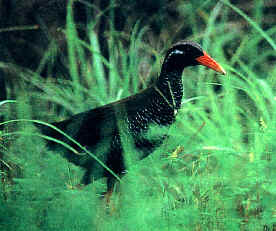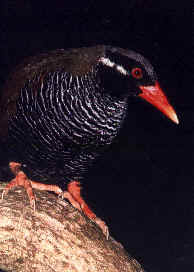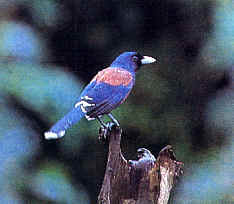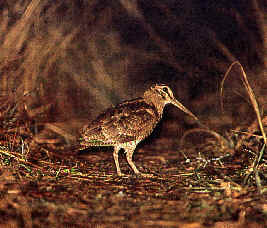
E-mail: font@focusonnature.com
Phone: Toll-free in USA 1-800-721-9986
or 302/529-1876; Fax: 302/529-1085
 |
PO Box 9021,
Wilmington, DE 19809, USA E-mail: font@focusonnature.com Phone: Toll-free in USA 1-800-721-9986 or 302/529-1876; Fax: 302/529-1085 |
"A future FONT tour in Japan with a Total Solar Eclipse"
In July 2009, there will be a FONT
birding & nature tour in Southern Japan, during which there will
be a Total Eclipse of the Sun. The dates of the tour will be July
12-26. The eclipse will be on the island of Amami.
On Amami, there are a number of interesting
birds, with some of them endemic to Japan, and a couple even endemic to Amami.
There's the shy Amami Thrush and the colorful Lidth's Jay. After
dark, there's the Amami Woodcock and the Ryukyu Scops Owl. A woodpecker
only on Amami that's been considered a subspecies of the widespread Eurasian
White-backed Woodpecker may well be a separate species. There's also the
dapper Ryukyu Robin, and the Ryukyu Flycatcher (a recent
"split" from the Narcissus Flycatcher). In the
summer, also on Amami, there's the Japanese Paradise Flycatcher and the Ruddy
Kingfisher.
We've birded Amami previously during about a dozen Japanese tours. We've always
done well there seeing the interesting birds, and we will again, in addition to
the experiencing the solar eclipse.
The island of Amami is one of the few pieces of land where totality will occur.
Most of the eclipse's path is over the Pacific Ocean.
Other islands that will be part of this tour will be Okinawa
(where there's an endemic Rail and a very rare & endemic
Woodpecker), and the more-southerly islands of Ishigaki
& Iriomote, in addition to the
southernmost of the main Japanese islands, Kyushu.
During 7 previous FONT birding & tours, since 1991, we've experienced eclipses
of the Sun. 4 of them have total solar eclipses (in Costa Rica,
Bolivia, Venezuela, & Turkey). 2 of them have been annular (in
Guatemala & Spain), and 1 of them was partial (in Iceland). We've
been so fortunate to have had good weather each time.
We're looking forward to July '09 in Amami.
At this time, there's still some availability on the tour. The itinerary
follows:
Birding in the Summer
With a
Total Eclipse of the Sun

Among the southern Japanese specialties and endemic birds:
the Ryukyu Serpent-Eagle, the Malayan Night-Heron, Ruddy Kingfisher,
Japanese Paradise Flycatcher,
Okinawa Rail, Pryer's Woodpecker,
Amami Woodcock, Ryukyu Robin, and Lidth's Jay.
And, the colorful Fairy Pitta!
These just a few of the many interesting birds to be found.
Included
in the tour is an overnight in a beautiful natural setting
with forest and a volcano,
a hot springs and a fine Japanese meal.
Links:
Solar
Eclipses during Previous FONT Tours
Cumulative
Japan Bird-List
Bird-List from previous Spring tours in Japan
Rare
Birds during our Japan Tours
Butterflies
Mammals
Photo
Gallery 1: Birds
Photo
Gallery 2: Birds & Other Wildlife
Itinerary:
Sun:
Jul 12 Arrival on international flights into Okinawa,
Japan. (Those coming from the US would have departed there on Sat. Jul
11.) Overnight in Naha.
Mon: Jul 13 Birding in the Naha area,
including visits to mudflats near the city (when the tide is right) and to some
rice paddies and other agricultural fields, to the north. A nice number of birds
should be found at both of these places, notably waterbirds and shorebirds
(or waders). From Okinawa, in the evening departure on an overnight ferry
from Naha to the southern Ryukyu island of Ishigaki.
Tue: Jul 14 The ferry to stop at the island of Miyako in the morning, and then arrive at Ishigaki, where we'll disembark, in the afternoon. Upon arrival on the tropical island of Ishigaki, there will be land-birding for such specialities as the Barred Buttonquail, Ruddy Kingfisher, Japanese Paradise-Flycatcher, and at dusk: the Malayan Night-Heron. Ruddy and Banded Crakes, Watercock and White-breasted Waterhen occur, as do a number of other birds, notably shorebirds (or waders). Overnight on Ishigaki.
Wed: Jul 15 Travel, this day, by boat, to another island, further southwest, Iriomote. More than 80 per cent of this forested island is a national park (the home of the rarely-seen Iromote Wild Cat). Birds that can be seen at sea in the area of Iriomote include: Brown Booby, Bulwer's Petrel, Streaked Shearwater, and various tropical terns: Black-naped, Roseate, Bridled, and Sooty. On Iriomote, a prime avian attraction is the rare raptor, the Ryukyu Serpent Eagle (formerly regarded as a subspecies of the Crested Serpent Eagle). Most readily seen on Iriomote with a large proportion of the species' population (about a hundred birds) there over two-thirds of them are on the island. Overnight on Iriomote.
Thu: Jul 16 After morning birding, travel by boat back to Ishigaki. Additional birding and overnight there.
Fri: Jul 17 Birding on Ishigaki in the morning. A flight, in the afternoon, back to Okinawa. Overnight there in Naha.
Sat & Sun: Jul 18 & 19 What should be especially interesting birding on our third tropical island of the tour: Okinawa. Where there are some especially interesting birds. Some rare, some endemic. Among the specialties, the very rare Pryer's Woodpecker (found during all previous FONT tours on Okinawa) and the Okinawa Rail (discovered only as recently as 1981). Also waterbirds such as: Cinnamon Bittern and Eastern Reef-Heron. Also occurring on Okinawa: the Ryukyu Robin and Amami Woodcock in the forests. At rice paddies, birds include the Cinnamon Bittern. Along the shoreline, Eastern Reef-Herons and Black-naped Terns. We'll be spending two nights in accommodations close to the best birdlife, at the north end of the island that's known as Yambaru, a region with forested hills, the special birds, and not many people.


The Okinawa Rail, that
only became known to science
about 2 decades ago, can be very hard to see.
During this tour, we'll have a good chance to do so.
Mon: Jul 20 Flight from Okinawa to the island of Amami. This to be the first of 3 overnights on that subtropical, hill, mostly-forested island, surrounded by coral reefs. On the island, interesting birds can be found, some endemic (or nearly-so), some rare: the Amami Thrush, Amami Woodcock, the beautiful Lidth's Jay, the Ryukyu Robin, and Ryukyu Scops-Owl.


Two of the bird
specialties of Amami Island,
the Lidth's Jay & Amami Woodcock
Tue &
Wed: Jul 21 & 22 Birding
on Amami a full day, and much of another. During our stay, we would have two
evenings for birding (for the woodcock and owl),
and two mornings (for the other good birds). During our second day on
Amami, we'll be in position to observe a total solar eclipse, that otherwise
would be in the skies over the Pacific Ocean and a part of mainland Asia. Since
1991, there have been 7 FONT birding & nature tours during which there have
been solar eclipses (4 of them of total, 2 of them annular, and 1 partial). This
will be our 5th Total Solar Eclipse during a FONT tour.
Both overnights (Jul 21 & 22) on Amami.
Thu: Jul 23 A flight from Amami to Kagoshima
(on the southernmost main Japanese island of Kyushu).
Upon arrival there, travel to the region of the nearby Ebino
Plateau for an enjoyable evening and night at a Japanese inn, with
some nice cuisine. The setting of that inn, by a beautiful national park: with
forest, and a volcano and hot springs. Japanese hot baths (onsens) will
be available for those who wish. And our first birding on Kyushu this day, of
course!
Fri: Jul 24
Today we'll aim to see one of the most colorful of all Japanese birds, the Fairy
Pitta. We'll be in an area of wonderful, mature forest where the bird
breeds every summer. (We may be a little late in the season, but the solar
eclipse is when it is - even so, the pittas should still be
present). Other "good birds" would also be in the area, including
some Japanese endemics not on islands we've already visited, such as the Japanese
Green Woodpecker and the White-bellied Pigeon. Overnight again near the
Ebino Plateau.
Sat: Jul 25: This, our last full
birding day in Japan, should be an interesting one. We'll explore a river
valley, from the seacoast upward into the mountains. As we ascend in the valley,
we'll be in areas where during our past tours we've seen Oriental Dollarbird,
Coppper Pheasant, Mountain Hawk-Eagle, and even "Snow Monkeys"
or the Japanese Macaque. We continue after dark for some nocturnal birds
and animals. During our previous tours in this area at night we've encountered Ural
Owl and Grey Nightjar. And animals after dark have included:
Raccoon Dog, Red Fox, Eurasian Wild Boar, Sika Deer, the True's
Shrew-Mole, and Large Japanese Fieldmouse. Our last overnight in
Japan, near the river.
Sun:
Jul 26 Flights, this day, for home. First, from Kyushu
to Osaka (or Tokyo), for the connecting international flights departing
from Japan.
Price:
US $2,795 per person, based upon double-occupancy.
Single supplement: US $395.
Includes:
All overnight accommodations.
All meals (except on Jul 12 and 26).
Ground transportation.
Ferries to Ishigaki and Iriomote.
Services of the FONT birding leader and local guides.
Does not
include:
Drinks and other items of a personal nature.
Air transportation (to/from & within Japan).
Focus On Nature Tours can arrange economical fares for flights to/from and
within Japan. Please
contact us regarding the best fares possible.
Participants
can opt to do their own flights to/from Japan (maybe with "frequent flyer
miles".) But, FONT will handle Japanese domestic flights during the tour.
The leader for this tour will be Armas Hill, who has birded in Japan numerous times since 1984.
A deposit of US $500 is required to register for this tour.